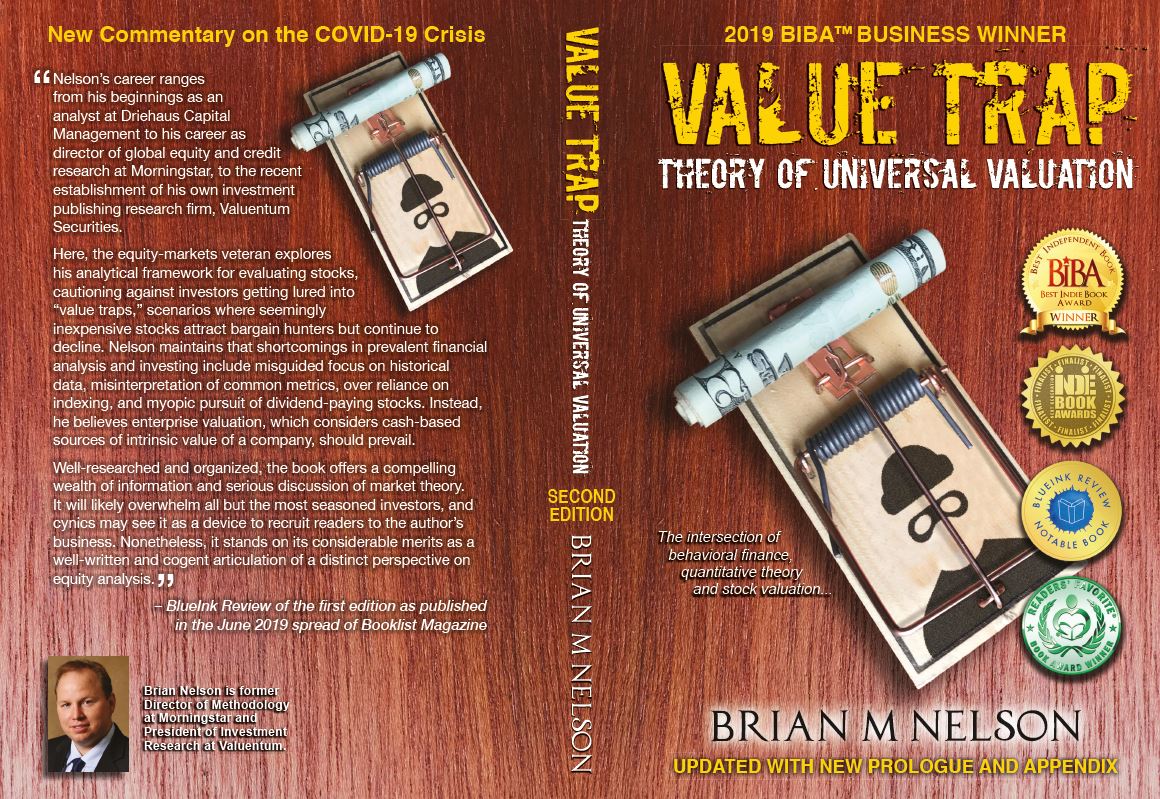Member LoginDividend CushionValue Trap |
Hats Off to Powell and Mnuchin!
publication date: Aug 27, 2020
|
author/source: Brian Nelson, CFA
 Hi everyone: Hi everyone:---
I hope you're doing great today. It's probably time we move past the long email chain format. During the COVID-19 crisis, I thought it would be a good idea to provide all of our latest correspondence in a stream, so you could conveniently monitor our every move (and always have previous correspondence handy). To some, it was confusing, to others absolutely necessary, but to us it was pivotal in gaining your trust.
----We're going to move beyond the stream format with today's email. However, in case you missed our prior correspondence, it can be accessed here. The archives of the Best Ideas Newsletter can be accessed here, and the archives of the Dividend Growth Newsletter can be accessed here. Our latest report updates can be accessed here. For new members, we're going to create a new website walk-through video, but you can read how many use our services in this article here. If you have any questions, just let me know. Remember though, Valuentum can never give buy or sell advice. I'll have a big announcement in this area coming soon, however.
----My hat goes off to Powell and Mnuchin. As you know, I used to be a big believer in (very) hands-off government policies when it comes to the free-market system, but we can no longer afford that today. There are too many investors that aren't paying attention to their investments and/or pursuing misguided correlation analysis. Many have noted, including Danielle DiMartino Booth, that "the Fed could be setting the US economy up for a harder fall down the road by flooding markets with cash and spurring investors to prop up firms that are not fit to survive." Almost completely lost today, however, is that the Fed and Treasury also propped up almost every investment firm tied to indexing and modern portfolio theory. Here's what I wrote in the second edition of Value Trap:
-----
Quite simply, if it were not for the bold Fed and Treasury actions taken during both the Great Financial Crisis and COVID-19 crisis, practitioners of indexing, modern portfolio theory and the efficient markets hypothesis would probably start to fall out of favor. Many capital-market-dependent assets held in index funds would have gone to $0 due to credit unavailability, correlations would have been even more nonsensical (approaching 1 across asset classes), and active investors would have outperformed tremendously as passive investors were caught like a deer in headlights. Never again would fiduciaries be able to use the efficient markets hypothesis as an excuse to not evaluate business fundamentals and calculate intrinsic values--considerations that efficient markets theorists seem to take pride in not doing.
----
I humbly ask: Is indexing and modern portfolio theory fit to survive? It's certainly debatable, but regardless of the merits of the discussion, these strategies are here to stay. There's no going back now. The government won't even let airlines fail. How could it possibly let these strategies fail? Regardless, I firmly believe the highest standard of care will always be estimating the value of assets held in client portfolios. To truly protect clients from the next financial crisis (just like with the COVID-19 crisis), understanding the cash-based sources of intrinsic value is paramount. The first question on any investor's mind should always be: What is this asset worth?
-----
The "Great Crash of 2020" has now passed. Sure, it's possible that we could have another modest retracement this year (after all, we just set all-time highs...again), but will we re-test the March lows again? No, not in my opinion. Things aren't as bad as they seem anymore either. The death rates of COVID-19 have been roughly flat the past many months, even as the media blasts that infection rates continue to spike. We have treatments for the disease, and our testing capabilities have increased significantly, with Abbott (ABT) announcing it has won FDA approval for a $5, 15-minute COVID-19 test. Let us all take a collective sigh of relief. We are over the hump, and the end of this pandemic is nigh, in my view.
-----The latest quarterly reports offered a number of insights. Pantry stuffing was prevalent, but mall-based retail is holding up better than some had expected due to digital initiatives. Cloud-based services companies continue to experience breakneck growth, and medical procedure volumes are picking up. There's been an acceleration in e-commerce, even within brick-and-mortar retailers, and the homebuilding and home improvement space look to be in a great position to capture shifting consumer demand as COVID-19 may have changed the housing preferences for an entire generation. We're staying away from office and apartment REITs.
-----What more can I say, my esteemed colleagues, advisor friends, and clients? Let us, of course, not let our guards down, but this "terrible thing" thrust upon humanity has largely run its course, in my opinion. To remind you of our prescient calls during these challenging times would continue to be viewed in distaste, so we must look forward with the wisdom we have gained. I believe the S&P 500 is approaching fair value, and our estimate remains in the range of 3,530-3,920. We're almost there. The ideas in the newsletter portfolios have done incredibly well.
-----
Some of you questioned my judgment when we announced that we were adding put options in February right before the crash. A doctor even told me that I knew nothing of what I was talking about. Then, when we said we expected the market would revert to more reasonable valuations in mid-to-late March with the market still experiencing "Great-Depression-like" conditions, many said I had no idea what I was talking about. The stock market will never be the economy. Please cancel your macroeconomic newsletters. They are only hurting you.
-----Then, we went "all in" in April. By mid-May, we had already made our minds up. I had been here before. I saw just how much moral hazard was rewarded after the Great Financial Crisis. Who could forget the piece released on May 15, "Stay Optimistic. Stay Bullish. I Am." Then, for us to remain bullish on big-cap tech, large cap growth, and the NASDAQ for months, all the way to new highs and beyond. Some of our members may not know that we also put up some tremendous success rates in the Exclusive, while revealing a steady hand in the High Yield Dividend Newsletter portfolio.
-----
Can you imagine if I told someone that we called the crash, called the bottom, highlighted outperforming equities at the bottom, selected the best-performing style bucket the past several months--all the while revealing 80%-90% success rates in the Exclusive, and writing and revealing it to our members every step of the way in full transparency. Nobody would believe it. That's why most of finance continues to believe markets are efficient, modern portfolio theory holds water under stress-conditions, and that nobody could beat the market.---
Even if they saw it, they still wouldn't, or rather couldn't, accept it. You know, however, and to me, that's all that matters. Next year, 2021, will mark 10 years at Valuentum. How time flies! Thank you for being on this journey with me. Always my very best.
-----
Kind regards,
-----
Brian Nelson, CFA
President, Investment Research
Valuentum Securities, Inc.
brian@valuentum.com
---
It's Here!
The Second Edition of Value Trap! Order today!
 -----
Related: RHHBY, QGEN, DHR, QDEL, OPK, TMO, GNMK, CODX, HOLX, BDX, DGX, LH
Valuentum members have access to our 16-page stock reports, Valuentum Buying Index ratings, Dividend Cushion ratios, fair value estimates and ranges, dividend reports and more. Not a member? Subscribe today. The first 14 days are free.
Brian Nelson owns shares in SPY and SCHG. Some of the other securities written about in this article may be included in Valuentum's simulated newsletter portfolios. Contact Valuentum for more information about its editorial policies. |


1 Comments Posted Leave a comment